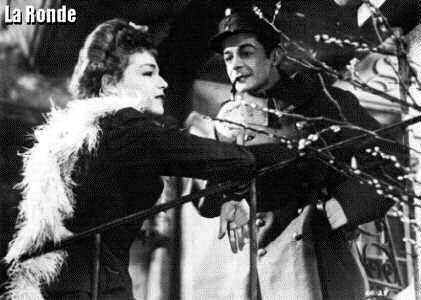 La Ronde has such a winning sense of humour, no? There's a moment in the film where a scene abruptly stops, and jumps to a shot of our cinematic guide (played with flair by Anton Walbrook) cutting away at some film strips. "Censorship!", he exclaims, before Strauss' delicious waltz resumes alongside the the aftermath of the offending scene. A moment like this should remove us from Ophüls' filmic world, but somehow it manages to feels like a continuation of its organic flow. Ophüls' ability to create a unique atmosphere of frivolity through his gorgeous sets and the trademark camerawork makes such bizarre humour completely plausible, and a delight to watch.
La Ronde has such a winning sense of humour, no? There's a moment in the film where a scene abruptly stops, and jumps to a shot of our cinematic guide (played with flair by Anton Walbrook) cutting away at some film strips. "Censorship!", he exclaims, before Strauss' delicious waltz resumes alongside the the aftermath of the offending scene. A moment like this should remove us from Ophüls' filmic world, but somehow it manages to feels like a continuation of its organic flow. Ophüls' ability to create a unique atmosphere of frivolity through his gorgeous sets and the trademark camerawork makes such bizarre humour completely plausible, and a delight to watch.Like its structural cousin Le Plaisir, La Ronde is so charming on a purely superficial level that it's easy to dismiss as nothing more than cinematic confectionery. And just like its cousin, La Ronde's spellbinding surfaces conceal surprising levels of depth. After all, this idea of the "roundabout" of human desire is - at its core - a depressing notion, no? Ophüls' irresistible artifice allows the concept to become palatable for audiences, but it also underlines the artificial nature of love in the film. Ophüls' pessimistic portrayal of romance, complete with constantly shifting relationships that end with little regard for either of the lovers (especially the women, for this director is always critical of the patriarchal order), is as fun-but-hollow as the mise-en-scène that's constructed around it. For all it's sparkle, it's the poignant moments of La Ronde that leave the most indelible of impressions: lovers being stood up, disregarded, forgotten. Of course, Ophüls' presentation of this is so fresh and 'modern' that we can't help but go along for the ride - before realising at the end that we too have been "used" by the romantic dazzle of the film itself.
Ophüls' style is as faultless as ever, but I feel his narrative occasionally lets him down here. La Ronde deals with ten different stories, and to maintain dramatic momentum when the plot is degenerating/regenerating every few minutes is a difficult task. Fortunately, Ophüls is talented enough to iron over these narrative creases making this is a minor gripe with what is undoubtedly another major work from this most brilliant of directors. Although I feel that Le Plaisir arguably performs some of the same intents better (it's certainly tighter in structure, and possibly THE peak of his stylization), this one still comes thoroughly recommended.
No comments:
Post a Comment